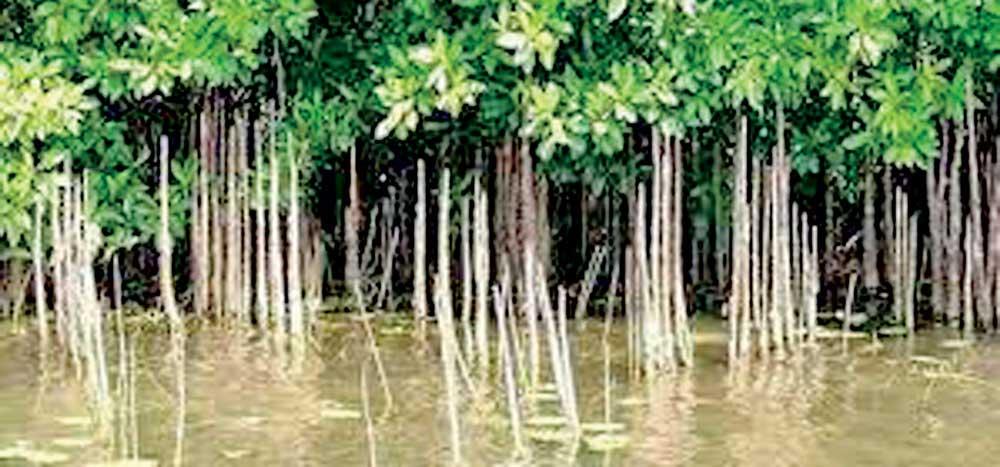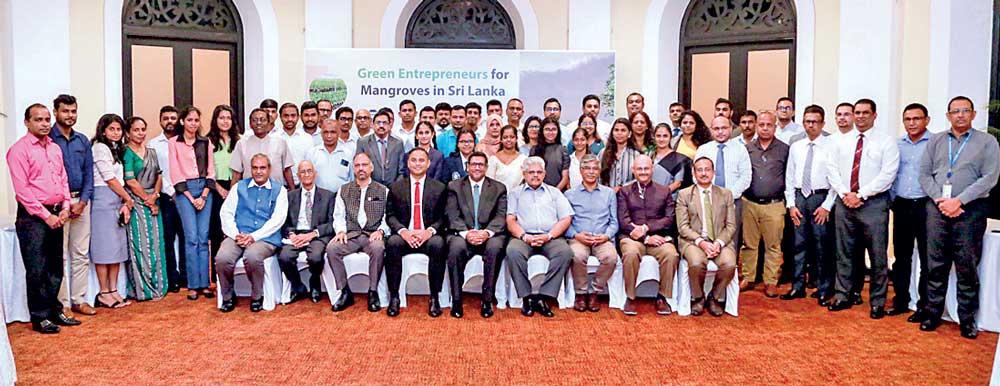Reply To:
Name - Reply Comment

The GEMS programme envisions preparing 6,500 young Green Entrepreneurs across Sri Lanka’s 64 DS Divisions with maritime boundaries
 Sri Lanka is embarking on an innovative journey to fuse environmental conservation with economic development through the ‘Green Entrepreneurs for Mangroves in Sri Lanka’ (GEMS) programme. This initiative, collaboratively driven by the Initiative for Livelihood Education and Development (iLEAD) International Academy, Chamber of Young Lankan Entrepreneurs (COYLE) and Centre for International Forestry Research and World Agroforestry (CIFOR-ICRAF), aims to create a sustainable future by nurturing young entrepreneurs dedicated to the restoration of mangroves and preservation of other ecosystem services of the country. This programme is being developed under the overall guidance and vision of the office of the Senior Advisor to the President of Sri Lanka on Climate Change and with the support from various divisions of the Ministry of Environment and other concerned ministries and government authorities.
Sri Lanka is embarking on an innovative journey to fuse environmental conservation with economic development through the ‘Green Entrepreneurs for Mangroves in Sri Lanka’ (GEMS) programme. This initiative, collaboratively driven by the Initiative for Livelihood Education and Development (iLEAD) International Academy, Chamber of Young Lankan Entrepreneurs (COYLE) and Centre for International Forestry Research and World Agroforestry (CIFOR-ICRAF), aims to create a sustainable future by nurturing young entrepreneurs dedicated to the restoration of mangroves and preservation of other ecosystem services of the country. This programme is being developed under the overall guidance and vision of the office of the Senior Advisor to the President of Sri Lanka on Climate Change and with the support from various divisions of the Ministry of Environment and other concerned ministries and government authorities.
GEMS Programme: Vision and Objectives
The GEMS programme envisions preparing 6,500 young Green Entrepreneurs across Sri Lanka’s 64 DS Divisions with maritime boundaries. These entrepreneurs will focus on sustainable exploitation of by-products from mangroves and other ecosystem services. Their responsibilities will include preserving, protecting, and restoring the quality of mangroves in their respective areas. The programme plans to invest USD 3.5 million, generating an annual local income of USD 26 million in the underprivileged coastal regions of the country.
Global Recognition and Support
Sri Lanka’s efforts have gained global recognition, with the country being selected as one of the seven UN World Restoration Flagships for its pioneering work in mangrove restoration. This accolade underscores the significance of the GEMS programme and its potential to serve as a model for other nations aiming to balance economic development with environmental sustainability.
Ruwan Wijewardene, Senior Advisor to the President on Climate Change, has emphasised the necessity of aligning economic development with ecological and environmental conservation. He has reiterated that these two aspects could and should complement each other. While the Managing Director of iLEAD International Academy, Ravi Pratap Singh, expressed full preparedness to identify, mobilise and train 6,500 youth across the coastal regions of the country. Thushira Raddella, Chairman of COYLE committed to provide mentorship support to all young green entrepreneurs emerging from the programme through their newly established Entrepreneurship Development Centre. Ravi Pratap Singh also added that the mobilisation and training of youth would be done in collaboration with various local partners working in the coastal regions on entrepreneurship and environmental awareness programmes. Dr. Rupesh Bhomia, a senior scientist of international repute, has committed his time to this programme and assured of continued technical support from CIFOR-ICRAF through its global expertise on the subject.
Bringing together stakeholders to galvanize the efforts
Earlier this month, a large gathering of stakeholders was organised through an event called ‘The Big Lunch’, which is inspired by similar events organised by the Eden Projects of the UK to promote mangrove restoration. ‘The Big Lunch’ was to generate actionable ideas for the GEMS programme. The event brought together a diverse group of stakeholders, including government representatives, UN agencies, business chambers, international and national NGOs, environmentalists, academic and research institutions, community practitioners, and youth. This gathering of more than 70 participants generated over 30 strong action ideas to ensure real impact of this programme on the ground.
This meeting in an informal environment would be followed up with a workshop of all the stakeholders next month, to be convened by the Centre for International Forestry Research and World Agroforestry (CIFOR-ICRAF) along with the Ministry of Environment to discuss the outcomes of ‘The Big Lunch’ and strengthen the strategies and work plan of GEMS programme.
The programme’s success will be bolstered by the continued support and active participation of all stakeholders, including international partners like the Eden Project of the UK and the M.S. Swaminathan Research Foundation, India, which will share their knowledge and expertise on mangrove restoration. This collaborative approach ensures that economic growth does not come at the expense of the environment.
Key Components and Support Systems
The programme will leverage science of decision-making to define the roles of three key stakeholders: community mobilizers, businesses, and research/academic institutions. The collaboration among these stakeholders is crucial to the success of the mangrove restoration efforts. COYLE will play a vital role by establishing an Entrepreneur Development Centre to provide mentoring support to budding entrepreneurs dedicated to green business practices.
The initiative also aims to create a conducive environment for dialogue and collaboration. The informal nature of ‘The Big Lunch’ facilitated in-depth discussions, resulting in actionable ideas. The event underscored the importance of collaborative efforts between businesses, research institutions, and youth mobilisation entities at the community level.
Expected Outcomes and Impact
The GEMS programme is expected to start the on-ground activities in September 2024. It aims to directly support more than 32,000 people and reach out to roughly half of the population (around 10 million) of the country. This initiative is anticipated to generate an annual revenue of Rs 7860 million (USD 26 million), significantly boosting the income of families in the underdeveloped coastal regions.
This initiative would be aligned with the UN Sustainable Development Goals, SDG-14, which focuses on sustainably managing oceans and coasts. Mangrove restoration also supports other SDGs related to poverty eradication, hunger elimination, livelihood and economic growth, climate action, and biodiversity conservation.

‘Green Entrepreneurs for Mangroves in Sri Lanka’ (GEMS) programme ready to coexist and thrive together
Conclusion
The Green Entrepreneurs for Mangroves in Sri Lanka (GEMS) programme represents a pioneering effort to harmonise economic and environmental goals. By fostering green entrepreneurship and promoting sustainable practices, Sri Lanka is paving the way for a greener, more prosperous future. The collective efforts of government bodies, business chambers, NGOs, and community members will be crucial in realising the ambitious vision of this programme.
As ground-level work begins in September 2024, the GEMS promises to be a transformative initiative, demonstrating that economic development and ecological conservation can coexist and thrive together. Through innovation, collaboration, and sustained commitment, Sri Lanka is set to lead the way in green entrepreneurship and environmental restoration.